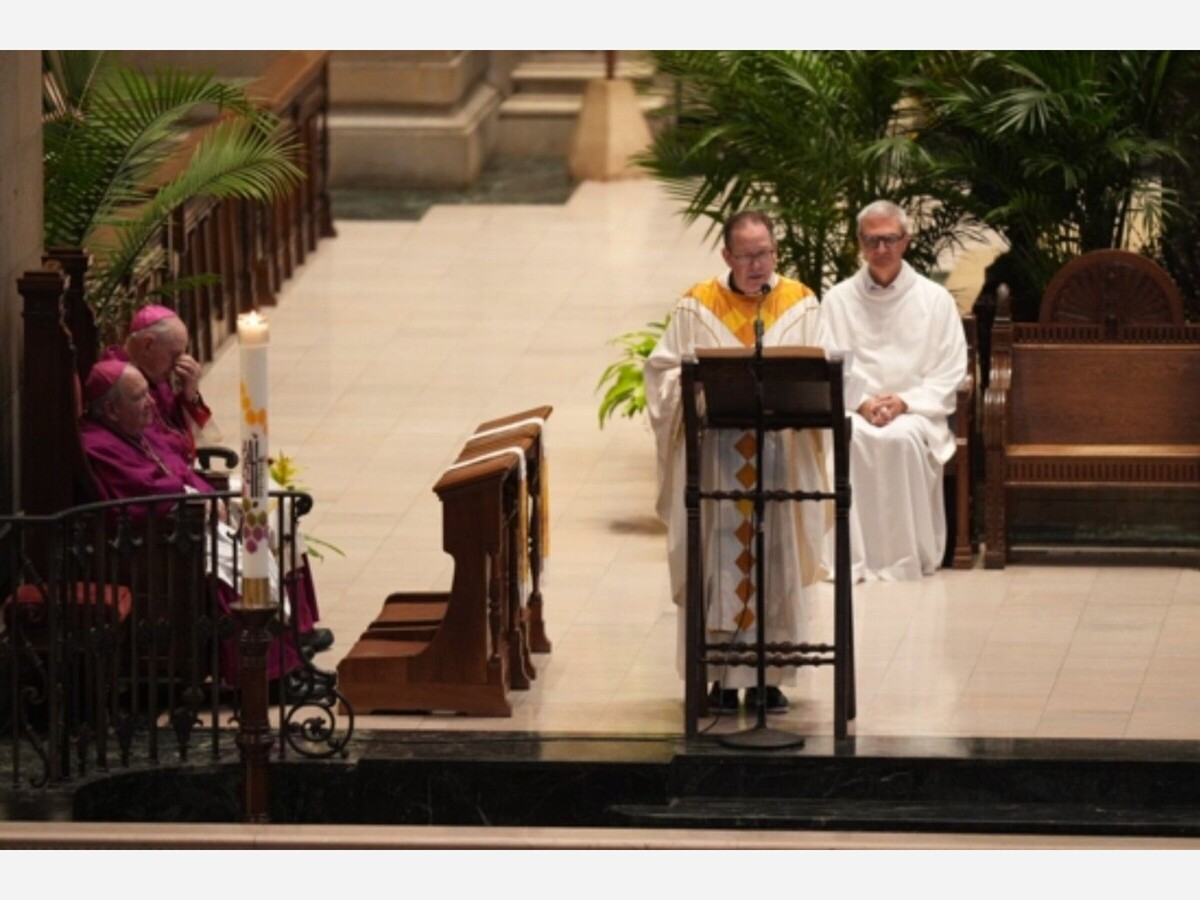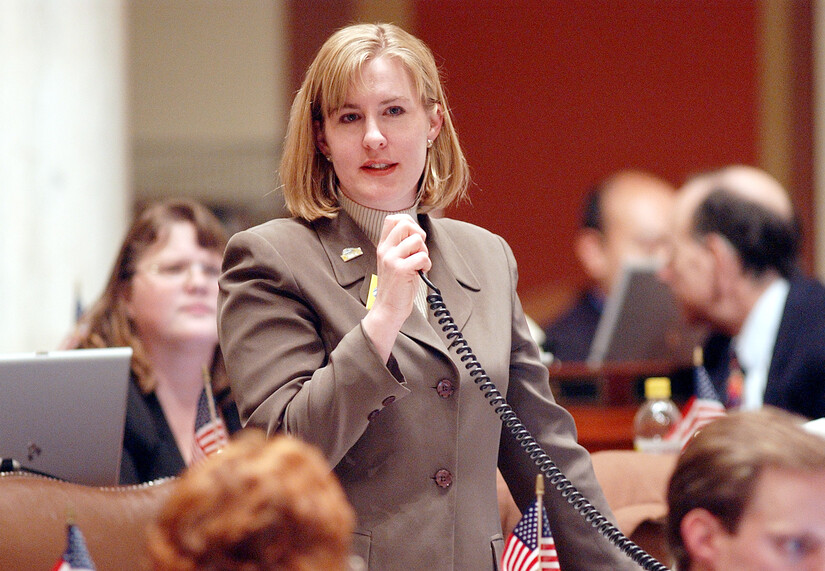Image


Fr. Daniel Griffith – Funeral Homily for Melissa and Mark Hortman
Basilica of Saint Mary
That, Majestic Alleluia.
I am reminded of the words of Saint John Paul II: “We are an Easter people, and Alleluia is our song.” We believe that death is not an end, but a passage to new life through the victory of Jesus Christ—proclaimed so beautifully in today’s second reading.
Again, welcome to the Basilica of Saint Mary. Thank you for your presence here today. Nothing conveys love and support more profoundly than simply being here. Thank you also to those joining us via livestream. To the family of Melissa and Mark—Sophie, Colin, and the parents of Melissa and Mark—our hearts are with you.

We will continue to pray for you, accompany you, and walk with you through your grief. Please know the love and support not only of this Basilica community but of the wider Minnesota and Twin Cities community.
Sophie and Colin—your grace and courage in the wake of your parents’ tragic death have been extraordinary. Thank you both for being a source of light and hope in this time of deep darkness. More on this in a few minutes.
Sophie and Colin have rightly expressed that today’s funeral mass should be a celebration—a celebration of Melissa and Mark’s lives, and of God’s love and grace. And so it is. Indeed, they lived lives full of purpose and meaning—lives in service to others, rooted in community, surrounded by family and friends.
Friends, God is present here.
God is present in this Basilica.
The Catholic Mass is imbued with the love and grace of God—who walks with us always, especially in our grief and in our hope for new life.
God loves each one of us with a deep, abiding, transformative love. We need to hear this more often: it is true.
Today, in the Catholic tradition, we also mark the Feast of the Immaculate Heart of Mary. Mary—honored as the mother of God—was, from the cross, given to all of us by Jesus as our spiritual mother. You can see that scene depicted to my left. Mary accompanies us just as she accompanied her son to the cross—as a tender mother in our time of greatest need.
My homily today will focus on Melissa and Mark, and the love of God. But the family has graciously allowed me to say a word about the wider context of our time—our present reality as a state and as a nation—as we search together for a brighter future.
In a recent exchange with a prominent Catholic layman, he wrote to me, “Our nation is in need of deep healing.” I could not agree more. At times, it feels like we are living in the dystopian vision at the beginning of W. B. Yeats’ poem The Second Coming.
But that poem ends with hope—and so do I.
My hope is in God, who made heaven and earth, who created and redeemed us, and who desires our healing and restoration. And that healing begins within each one of us—in our hearts.
It starts with accepting God’s invitation to be loved, to enter into friendship with Him, and to be sent into society as leaven for the good. I believe we can open ourselves to God’s abundant grace—including me. Including all of us.
Here in Minnesota, we have sadly been ground zero for both racial injustice and, now, political violence and extremism. The killing of George Floyd happened just miles from this church. And now, tragically, we mourn the violent deaths of Melissa and Mark.
Both of these realities—racial injustice and political violence—must be denounced in the strongest possible terms. They threaten human dignity and the very foundation of our democracy.
Sadly, racial disparities in Minnesota remain some of the most severe in the country. While there has been modest progress in some areas, we’ve also seen widening gaps in others over the last five years.
But, friends—Minnesotans—this can also be a ground zero for healing, for restoration, and for justice.
But we must work together. And there is much work yet to do.
Your presence here today is a sign that we are willing to do that work.
Memory is an essential dimension of the Christian faith. It was memory of God’s liberating action in Egypt that formed His people and foreshadowed Christ’s mission. It was memory of Jesus’ words and deeds that shaped the Gospels. And on the night before he died, Jesus told his disciples to “do this in memory of me.”
So too, when we honor the memory of Melissa and Mark, we honor the God who created them, redeemed them, and gifted them to us.
In conversations with family, friends, and colleagues, two themes consistently emerged about Melissa and Mark:
Service and Community.
They met through service—a beautiful story.
They were both assigned to assist the same student, and legend has it that Mark may have moved in just a little bit closer. Some might call that serendipity; I call it Providence.
Bob Warhol, our longtime maintenance worker here at the Basilica, remembered Melissa serving in a nursing home while still in high school. As her father Harry shared, she always lived by the Golden Rule. It’s no surprise that she and Mark were such a natural pair.
They shared values, a rich humanity, and a powerful pairing of intellect and compassion—a combination I’ve always admired.
The Catholic theologian Romano Guardini once wrote, “All power is rightly exercised in service,” and he pointed to Jesus Christ as the ultimate example. I quoted this at the funeral of Tom Johnson, our three-time Hennepin County Attorney—and it is equally true of Melissa and Mark.
Catholic Social Teaching holds that all authority should be directed toward the common good—never for self-aggrandizement, but for the flourishing of all, especially the marginalized.
Melissa lived that truth as a legislator. Even in law school, friends like Matt Forsgren recognized her immense potential to lead and serve. Matt wrote on LinkedIn that Melissa was a “force for good.” And, as he watched her career unfold, he said he was even more grateful that she chose a life of public service over the many legal opportunities she could have pursued.
A bishop friend of mine—who once served in Minnesota and now leads on the East Coast—said this of Melissa:
“She lived by the Golden Rule. That was also my experience of her. It’s what made her capable of reaching across the aisle. She was respectful, even when we disagreed.”
May she rest in peace.
The second defining light in their lives was community. The family described their neighborhood as an extraordinary place of community—and Mark and Melissa helped foster that sense of connection.
At one point, they moved just 15 houses down the street. They literally walked the couch to their new home—next to Edinburgh Golf Course. I may have dug a few golf balls out of their yard, unintentionally!
They enjoyed time on their deck, monthly dinners with their law school friends. I’m a professor at St. Thomas Law School, and I can’t imagine how they managed such deep, intentional community with such full lives. But they did. And it was beautiful.
They shared a love for travel, hobbies, and family. Mark was a curious hobbyist—he loved mountain biking and furniture-making. Colin shared a moving story of building furniture with his father—furniture that he hopes his future children will one day use.
The children spoke of Mark’s big smile, his “cheesy” dad jokes, and his indomitable spirit.
And then, of course, there was Gilbert—the dog. The Hortmans took in and trained dogs, including one that became a successful service dog. Gilbert, however, bonded so deeply with Melissa (thanks in part to an abundance of treats) that he may have flunked service school on purpose—just to come back home.
The Hortman home stood as a countercultural witness against the idol of autonomy that often defines American life. In a culture steeped in individualism and loneliness, they modeled intentional community.
Now, friends, we turn to scripture for wisdom. In the first reading, we hear: “The souls of the just are in the hands of God, and no torment shall touch them.”
Those who trust in God are led to truth.
Melissa and Mark were good and just people. None of us are perfect—but when we meet God face to face, we meet the God of love, justice, mercy—and truth.
The second reading, from Corinthians, reminds us that in Christ, death is not the end. “Where, O death, is your victory? Where, O death, is your sting?” These words proclaim the triumph of the cross and the empty tomb.
The Gospel—Matthew’s Beatitudes—teaches us how Christ lived: in humility, in self-gift, in love.
Can you imagine a world in which Christians, and all people of faith, lived the Beatitudes faithfully? What transformation that would bring to our society and our world.
It is possible.
Finally, let me return to Colin and Sophie. I was truly amazed by them. As you will hear in the eulogies, they are a beautiful reflection of their parents—in their compassion, their justice, their intelligence, and their humanity.
Colin and Sophie, know this:
You will feel your parents’ presence throughout your lives—in both the big and quiet moments. They will be with you.
In their remarkable public statement after their parents’ deaths, they wrote:
“Plant a tree. Pet a dog. Try a new hobby, like Dad. Stand up for justice and peace. The best way to honor our parents’ memory is to do something to make our community a little bit better for someone else.”
Melissa and Mark lived this reality.
And let me end with one final, beautiful image:
Linda shared that she found the Prayer of Saint Francis in Melissa’s purse—worn with use.
Lord, make me an instrument of your peace…
You will hear it sung later in the liturgy. That prayer—and that life—calls each of us to be peacemakers.
Heavenly Father,
We thank you for the lives of Melissa and Mark Hortman.
We thank you for their legacy of service and community.
May their memory always be a blessing.
And may they rest in peace.
Amen.